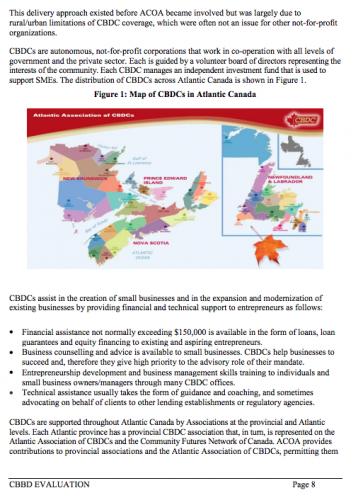ACOA’s Community-Based Business Development (CBBD) sub-program focuses on activities to improve access to capital and other supports needed to strengthen small and medium-sized enterprises (SMEs) in rural communities across Atlantic Canada. The programming supports the achievement of ACOA’s Community Development (CD) program goal to foster dynamic and sustainable Atlantic communities and, more broadly, the Agency’s mandate to increase opportunities for economic development in Atlantic Canada.
The majority of activities undertaken under the CBBD are supported through the Community Futures Program (CFP), a national transfer payment program currently administered by five departments and agencies. In Atlantic Canada, the CFP is administered by ACOA, supported by a network of 41 Community Business Development Corporations (CBDCs). The balance of CBBD activities utilize a combination of the Business Development Program and Innovative Communities Fund transfer payment programs.
Over the six-year period of the study (2007-2008 to 2012-2013), CBBD programming represented nearly 16 per cent of overall CD program expenditures ($769 million) and 6 per cent of total Agency expenditures ($2,171 million). The purpose of this evaluation is to assess the relevance and performance of CBBD programming. The evaluation fulfills Government of Canada accountability requirements as well as the information needs of ACOA’s senior management. It was undertaken according to the terms of reference for the study, approved by ACOA’s executive committee in December 2012.
The evaluation methodology included interviews with 64 key informants, a CBDC recipient survey (response rate of 41 per cent), a CBDC client survey (response rate of 9 per cent), CFP performance analysis based on Statistics Canada data, as well as administrative and financial analysis incorporating data from a variety of sources. Evaluation findings are based on a high level of convergence of multiple lines of evidence and are deemed reliable and valid within the context of the study limitations.
Download the report
Table of Contents
| Acknowledgements | ||
| Executive Summary | ||
| 1. Introduction | ||
| 1.1 Evaluation Overview | ||
| 1.2 Evaluation Design and Methodology | ||
| 1.3 Evaluation Strengths, Limitations and Mitigating Measures | ||
| 2. Profile of the Community-Based Business Development Sub-program | ||
| 2.1 Context | ||
| 2.1.1 Community Futures Program | ||
| 2.1.2 Other CBBD programming | ||
| 2.2 Program Theory | ||
| 2.2.1 Program Logic Model | ||
| 2.3 Program Accountability and Governance | ||
| 2.4 Expenditure Profile | ||
| 2.4.1 CBBD Expenditures | ||
| 2.4.2 Project Profile | ||
| 3. Findings: Relevance | ||
| 3.1 Continued Need for the Programming | ||
| 3.2 Alignment with Government Priorities | ||
| 3.3 Alignment with Federal Roles and Responsibilities | ||
| 4. Findings: Performance – Effectiveness | ||
| 4.1 Incrementality | ||
| 4.2 Achievement of Expected Results | ||
| 4.2.1 Immediate and Intermediate Outcomes | ||
| 4.2.2 Ultimate Outcomes | ||
| 4.3 Unintended Outcomes of CBBD Programming | ||
| 4.4 Barriers to the Achievement of CBBD Outcomes | ||
| 4.5 Adequacy of Performance Measurement | ||
| 5. Findings: Performance – Efficiency and Economy | ||
| 5.1 Efficient Utilization of Resources | ||
| 5.1.1 Structures and Mechanism that Support Efficiency and Economy | ||
| 5.1.2 Delivery Costs | ||
| 5.2 Management of Loan Funds | ||
| 5.2.1 CBDC Loan Approval Rate and Average Loan | ||
| 5.2.2 CBDC Loan Loss Rates | ||
| 5.2.3 Percentage of Investment Funds in Active Loans | ||
| 5.3 Alternative Modes of Delivery, Lessons Learned and Best Practices | ||
| 5.3.1 Alternative Modes of Delivery | ||
| 5.3.2 Lessons Learned and Best Practices | ||
| 6. Conclusions and Recommendations | ||
| 6.1 Conclusions | ||
| 6.2 Recommendations | ||





